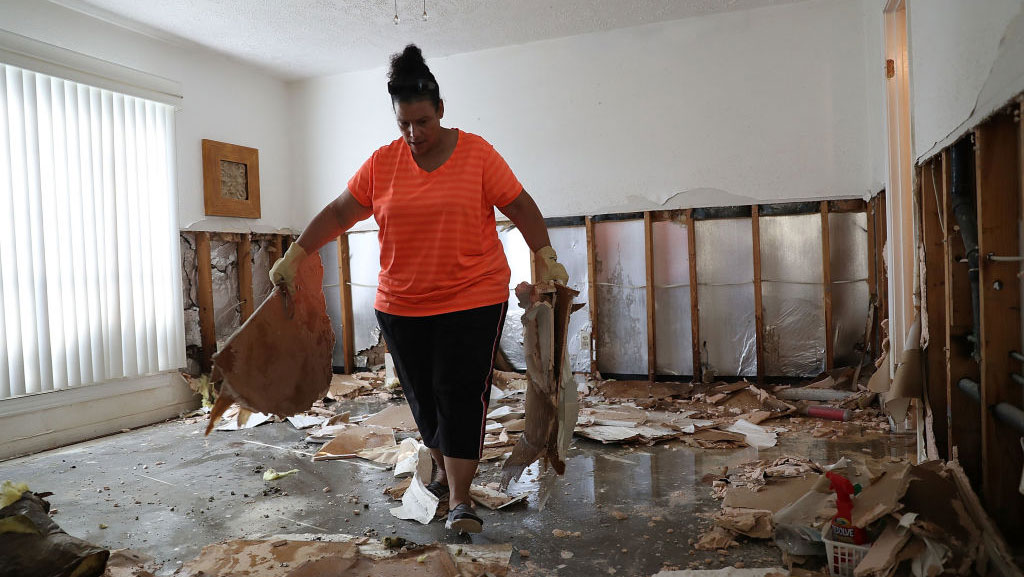Regina Perry lugs damp sheetrock as she cleans of her residence that was swamped with water as she starts the procedure of reconstructing after Cyclone Harvey triggered prevalent flooding in Houston. Joe Raedle/Getty Pictures
Financial mathematics does not constantly accumulate. The toughness of an economic situation is assessed by its gdp (GDP), which is procedure of manufacturing or overall financial task. By that mathematics, it’s feasible to claim that a disaster like Cyclone Harvey can be a “” great”” point. That’s due to the fact that the billions invested in Houston on cleaning, building and also framework upgrades will inevitably increase overall financial task and also increase GDP.
“” If that held true, after that everyone would certainly align to have a typhoon strike them,”” claims David Letson, a financial expert in the Rosenstiel Institution of Marine and also Atmospheric Scientific Research at the College of Miami. “” There’s a shot of cash from various other locations which can turn up as regional financial investments. It holds true that you obtain brand-new structures and also brand-new innovation, however those sources can have mosted likely to various other usages. So, no, it’s not a good idea.””
This is an instance of the damaged home windows misconception, initial shown by French economic expert Frederic Bastiat. If a young boy damages a home window, his daddy needs to pay the windowmaker for a brand-new one, so in theory the windowmaker currently has additional money to invest in another thing and also promote the economic situation. However what this likewise does is leave the daddy with much less non reusable revenue to pay the butcher or the shoemaker. So, there isn’t truly any kind of financial gain.
Theoretically, disasters like storms can start regional economic climates, however just if that economic situation showed particular features prior to the tornado. For instance, back in 2010, the Houston economic situation remained in an economic crisis. As The New york city Times explains, joblessness in Houston was as high as 27 percent in 2010 which consisted of countless building employees. If a typhoon like Harvey had actually struck in 2010, it would certainly have brought those still knowledgeable employees back on line.
However the Houston economic situation in 2017 is extremely various than it was 2010. The oil industry has actually picked up therefore has the real estate market. Prior to Cyclone Harvey struck, joblessness in Houston was to 4 percent. There had not been an extra of knowledgeable building employees, however a scarcity. According to an August 2017 study by the Associated General Professionals of America, 70 percent of specialists in the South claimed they were having problem discovering craft employees.
“” If you have slack in the economic situation, sources that are entirely still, after that of course, you would certainly place them to function,”” claims Letson. “” However that’s normally not the situation. We’re not in an anxiety currently.””
The instant outcome of Harvey is that 10s of hundreds of Houston-area building employees are mosting likely to be drawn away from growth-related jobs to demolition and also restoring. As well as the boom sought after for building jobs is mosting likely to call for an increase of teams from beyond Houston. A lot of that government help and also insurance policy cash will eventually leave the location.
The temporary financial results of a disaster are clear. Huge losses to home and also funding are rather countered by an increase of outdoors cash. However the long-lasting effect of a Storm like Harvey or Irma is unbelievably tough to forecast, and also it alters from place to place, economic situation to economic situation.
It’s still prematurely to gauge the damages of Cyclone Irma on Florida however also if the damages to framework is fairly reduced, there will certainly still be losses to the vacationer and also farming economic climates.
Michael Dolfman was a financial expert with the Bureau of Labor Stats when Cyclone Katrina struck New Orleans, creating huge flooding that took greater than 1,500 lives in Louisiana alone. 10 months after the tornado, he co-authored a record tallying the financial prices of Katrina to individuals of New Orleans.
Throughout the 3 months straight after the storm and also flooding, New Orleans shed 105,300 tasks– that’s greater than 40 percent of the city’s labor force at the time. The heaviest losses remained in tourist and also retail, although healthcare and also social solutions likewise took a hit. Most of those tasks never ever returned.
“” New Orleans was harmed negative by Katrina. Some individuals claim it never ever truly recuperated,”” claims Dolfman. “” They shed population.Their economic situation was driven by tourist and also regional points: education and learning, transport, food solutions.””
10 years after Katrina, the Brookings Institute discovered that when the post-storm restoring boom had actually passed, task development in New Orleans was slow-moving, and also 7 out of 10 tasks that did return were low-wage, like tourist and also retail.
Dolfman thinks that Houston will not comply with the New Orleans trajectory. Both cities endured disastrous flooding, however that’s where the resemblances end. Unlike New Orleans’ extremely regional economic situation, Houston’s economic situation has a nationwide, also worldwide effect. Houston is the fourth-largest city in the nation and also its GDP is half a trillion bucks.
“” The nation and also the globe requires what Houston creates in regards to oil,”” claims Dolfman. The bigger economic situation likewise relies on Houston’s payments to the health care industry– [like] the MD Anderson Cancer Cells Facility– and also on its durable production industry. Since Houston’s economic situation was vivid and also worldwide prior to the tornado, Dolfman claims, “” those tasks are mosting likely to return.””
Since’s Fascinating
A 2014 research study considering storms, tropical cyclones and also cyclones from 1950 to 2008 discovered that in many cases, tornados were extremely negative for regional economic climates– and also the results remained for 20 years.

